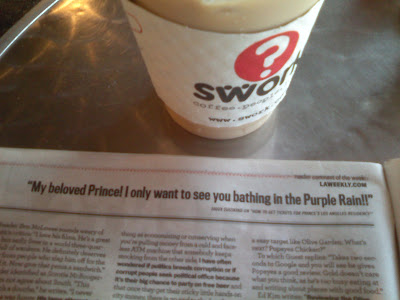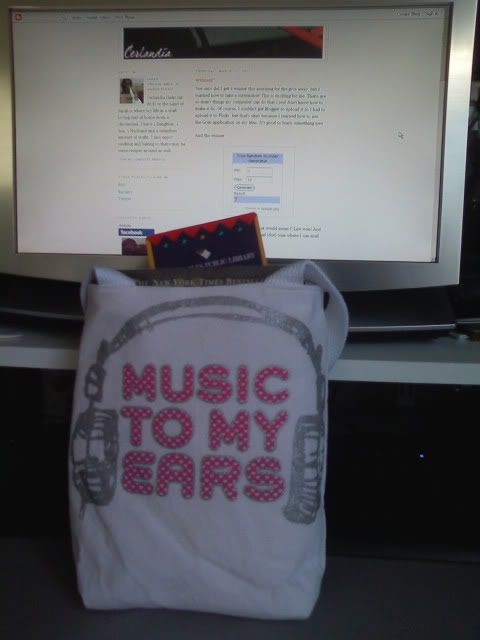
Reading an LA Weekly is my monthly indulgence.
I'm really excited! 7 must be my lucky integer.Also, because I like free and I'm sure you do too, a giveaway! One lucky person could win this small handbag upcycled from a t-shirt. All you have to do is leave a comment. I would love for you to follow the blog and tell all your friends as well, but it isn't a requirement. I feel like you should follow the blog just because you love it. Winner will be announced Thursday March 31.And here's the awesome bag:











THE CULINARY HISTORIANS OF SOUTHERN CALIFORNIA PRESENT
ANDREW F. SMITH SPEAKING ON
“HOW FOOD WON THE CIVIL WAR” AND “POTATO: A RAGS TO RICHES STORY”
Saturday, March 12th, 10:30 a.m. at the Los Angeles Public Library
Mark Taper Auditorium, Downtown Central Library, 630 W. 5th St.
Free and open to the public
Andrew F. Smith will discuss his two soon-to-be published books: Starving the South: How the North Won the Civil War (St. Martin’s) and Potato: A Global History (Reaktion Books).
Did hunger defeat the Confederacy? Culinary historian Smith will take a gastronomical look at the war and its legacy. From the first shot fired at Ft. Sumter to the surrender of the
Confederacy in April 1865 food – or its absence – played a crucial role in how the war was fought and its outcome. While the Civil War split the country in a way that affects race and politics to this day, it also affected the way we eat and drink.
He will also discuss the rags to riches story of the potato, examining how the once lowly vegetable that has changed – and continues to change – the world. Despite its popularity, in this era of fast food and health consciousness, the potato is now suffering negative publicity. Its health benefits continue to be debated, especially since it is most often associated with the ubiquitous but high-calorie french fry.
A reception with themed refreshments will follow the talk at approximately 11:30.
Chorizo & potato tacos with pico de gallo, fruit punch with slices of green apple, potato cake with a blackberry reduction, homemade potato chips.
ABOUT ANDREW F. SMITH
Andrew F. Smith teaches food history at the New School University in Manhattan. He is the author or editor of 19 books, including his most recent books Starving the South: How the North Won the Civil War and Potato: A Global History. He serves as the editor in chief for the Oxford Encyclopedia of Food and Drink in America. He has written more than 300 articles in academic journals, popular magazines and newspapers. For more about him, visit his website: www.andrewfsmith.com
Ikebana instructor Youkou Kitajima of the Sogetsu School gave an interesting slide show lecture and demo of modern vs. traditional kadomatsu techniques. Of course, the best part was getting to make our own miniature kadomatsu. It was well worth the materials fee.
Kitajima-san is an awfully nice guy. He owns NK Nursery - specializing in Japanese pine - in the City of Industry. And he volunteers to prune the pines at the JACCC. He took questions and instructed us on the proper way to prune pine and fruit trees (which I never really understood til now).
The Japanese have elevated the everyday affair of tea drinking to a high art. In January, many Japanese will observe the "first kettle," the first tea-drinking party of the New Year. Novelist Liza Dalby lived in Japan for several years. This month, she describes her celebration of the "first kettle" in San Francisco.
 Haneto Truth #2: Save your energy.
Haneto Truth #2: Save your energy.